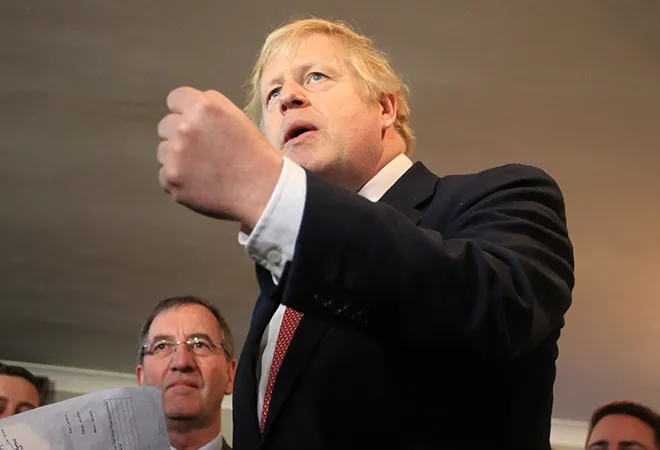-
CENTRES
Progammes & Centres
Location
The simple fact is that there are no easy answer for progressives, whether in Europe, Asia or America.

The wholesale defeat of the Labour Party in Britain’s general elections is unprecedented in scale. The party has won the fewest seats of any election since the 1930s — during a period when, in fact, the party itself had split into two. Worse, it has lost seats to Prime Minister Boris Johnson’s Conservatives even in areas which have been Labour strongholds for decades, and where the cultural resistance to voting Tory seemed, in the past, insurmountable. Appropriately, among the seats lost to the Conservatives in the formerly industral north of England is Sedgefield — which was, for his entire career, former prime minister Tony Blair’s seat. Nothing could better indicate the distance that Labour has travelled since Blair took the party to three successive election victories from 1997 on.
The immediate consequence may be, of course, that Johnson’s Conservatives now have the mandate to take Britain quickly out of the European Union. This would be a secret relief to many in Europe who, while sad to see Britain go, are exasperated by how long the process of Brexit is taking and the degree to which it colonises time that Brussels would prefer to spend on reviving the continent’s economy. The size of his majority is, paradoxically, good news for those who fear the consequences of Brexit. Johnson now has enough of a parliamentary cushion that he has no reason to pander to the hardest Eurosceptics within the Tory party, and is additionally responsible to a large bloc of new Tory voters in the north of England who would be vulnerable to a no-deal exit from the European Union. Not every populist is identical, some are more careerist than ideologue — and he seems to be one of these, indicating that while Brexit is now unfortunately inevitable it may not be softer than was feared at points over the last year.
But that is the extent of what can be hoped for. Other implications of this election result are very disquieting for the stability of the United Kingdom — which is, remember, the location of a financial centre vital to India Inc., as well as a significant investment and trade partner. The end of a Brexit crisis will precipitate others, in particular in Northern Ireland and Scotland. Unless a hard border is avoided in Northern Ireland, there is a real threat to the region’s decades of peace. Worse, Scotland and England are now on a collision course. England voted overwhelmingly for the Tories and to leave Europe; Scotland has given the pro-independence and pro-Europe Scottish National Party an even more comprehensive sweep. Scotland First Minister Nicola Sturgeon has already made it clear, in her remarks after her victory, that she views the Scottish mandate as an indication that its parliament does not need a UK prime minister’s “permission” to move towards independence. Johnson will do all in his power to block another independence referendum. Another constitutional crisis, along the lines of what has happened in Catalonia, is not out of the question.
The larger question for observers of politics worldwide is where this result fits into the broader narrative about the upsurge in populism and right-wing nationalism. Stylistically, it ticks all the boxes. A charismatic but essentially deceptive leader; a discredited social-democratic alternative alienated from its former working-class base for cultural reasons; a growing political divide between those more educated and those less; and the willingness to absorb economic pain in the service of nationalist or xenophobic reasons.
Progressive politics has struggled to come to terms with these factors wherever they have emerged, whether in Britain, the United States, Turkey, Southeast Asia or India. Briefly it was hoped that a left-populism would somehow be potent enough to nullify the populism of the right; but the Corbyn experiment, in which the Labour Party gave itself over to a hard-left faction of enthusiasts, has failed spectacularly at overcoming the cultural divide.
The simple fact is that there are no easy answer for progressives, whether in Europe, Asia or America. The few places where the centre-left has held its ground it does so tentatively, and with flawed but charismatic young leaders such as Justin Trudeau or Emmanuel Macron. Neither of these inspires enormous loyalty any more, but they are less unpopular than their main rivals, and can at least pretend to be unifying, optimistic and forward-looking figures. Places without such a figure — Germany, India — seem fated to see the centre-left move towards political extinction.
What would be fatal, certainly, is to tell oneself lies about the popularity of one's own political platform and positions. The creation of echo chambers online and the increasing self-segregation geographically of those with different opinions means that it is easy to convince yourself that a silent majority agrees with you. Most of the time, they don’t. For progressives, it can no longer be about “clever politics” or “mobilisation”. We have to move two steps back in the game, and go back to “persuasion”.
This commentary originally appeared in Business Standard.
The views expressed above belong to the author(s). ORF research and analyses now available on Telegram! Click here to access our curated content — blogs, longforms and interviews.

Mihir Swarup Sharma is the Director Centre for Economy and Growth Programme at the Observer Research Foundation. He was trained as an economist and political scientist ...
Read More +